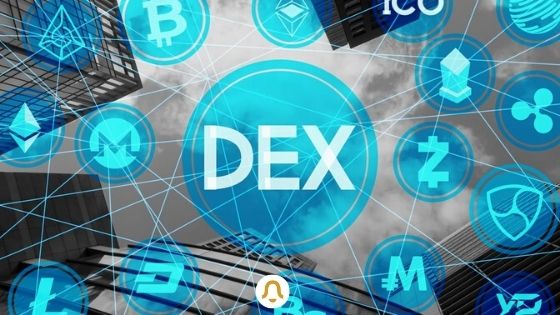The term DEX is the abbreviation in English of “Decentralised Exchange”, that is to say decentralized exchange in French. It is sometimes possible to find the spelling “decentralized” when using American English.
Decentralized exchange sites allow users to buy or sell cryptocurrencies without having to entrust their digital assets to a traditional platform. On this type of exchange, investors permanently own their crypto-assets and therefore have total control over them.
What are the advantages of a decentralized exchange?
Here is a small list of the advantages of using a DEX over a traditional exchange:
- The platform does not own your crypto assets and therefore does not take care of storing them in its personal wallets, which avoids losing its digital assets in the event of hacking of the site or exit scam ;
- All trading operations are peer-to-peer between two sellers. DEX just provides the interface that facilitates transactions and acts as a trusted third party. Decentralization is therefore at its maximum while offering security to users;
- The popularity of this type of platform increases over time;
- Identity verification measures are either non-existent or much more flexible than on centralized platforms, which allows individuals to remain anonymous.
What are the different types of decentralized exchanges that exist?
There are several different types of decentralized exchanges. However, for the sake of simplicity, we’ll only cover the two most popular ones.
First, there are DEXs that have an order book, that is, where sellers and buyers can choose the price at which they want to buy or sell their digital assets. The operation of these platforms is very similar to that of centralized exchanges, but users keep the advantage of always having their cryptos in their possession. One can cite for example IDEX.
- Towards a decentralized financial ecosystem: The DEFI
- Blockchain and Crypto: What is a fork?
- Blockchain and crypto: What is the hashrate?
- Blockchain and crypto: What is proof of stake?
Then there are the DEXs which work without an order book, also known as Automated Market Makers (AMM). On these decentralized exchange sites, the price is set automatically, whether for buyers or sellers, depending on the number of tokens you want to buy or sell. Thus, users have the guarantee of being able to obtain their tokens at a fair price because it reflects the supposed real value of a cryptocurrency thanks to the mechanism of supply and demand. As an example, we can cite Uniswap.
Will DEXs supplant centralized exchange sites?
DEXs are increasingly popular, but as of this writing (July 2021), they still have a long way to go before they can offer services as diverse as some centralized exchanges. As a result, classic platforms are still widely used by many crypto-investors because they are more comfortable and enjoyable to use.
However, things are gradually improving and some decentralized exchange sites are starting to offer slightly more advanced features. As a result, we can logically hope that in the long term the services offered will be of a quality comparable to those of centralized exchanges, while allowing users to better secure their digital assets.
However, it is difficult to be able to say with certainty whether DEXs will supplant traditional exchanges or not in the long term. Indeed, it depends on many factors, such as the improvement of decentralized exchange sites, but also on the various legislations which are slowly being put in place in the various countries of the world. Thus, it is quite possible that some centralized exchanges will eventually have to comply with security measures as strict as those imposed on banks, which would undermine the advantage of DEX decentralization from a security point of view.
Conclusion on DEX
As we have seen, DEXs make it possible to resolve certain concerns that currently exist on traditional buying and selling platforms. However, this is quite new and decentralized exchange sites, although they are becoming more and more popular, are only used by a small percentage of crypto investors.
Decentralized exchanges are still in their infancy, which means that a lot can still happen in this industry. The technology and the user-friendliness of the platforms improve over time, but it is not impossible that certain laws come to undermine the development of the sector.


